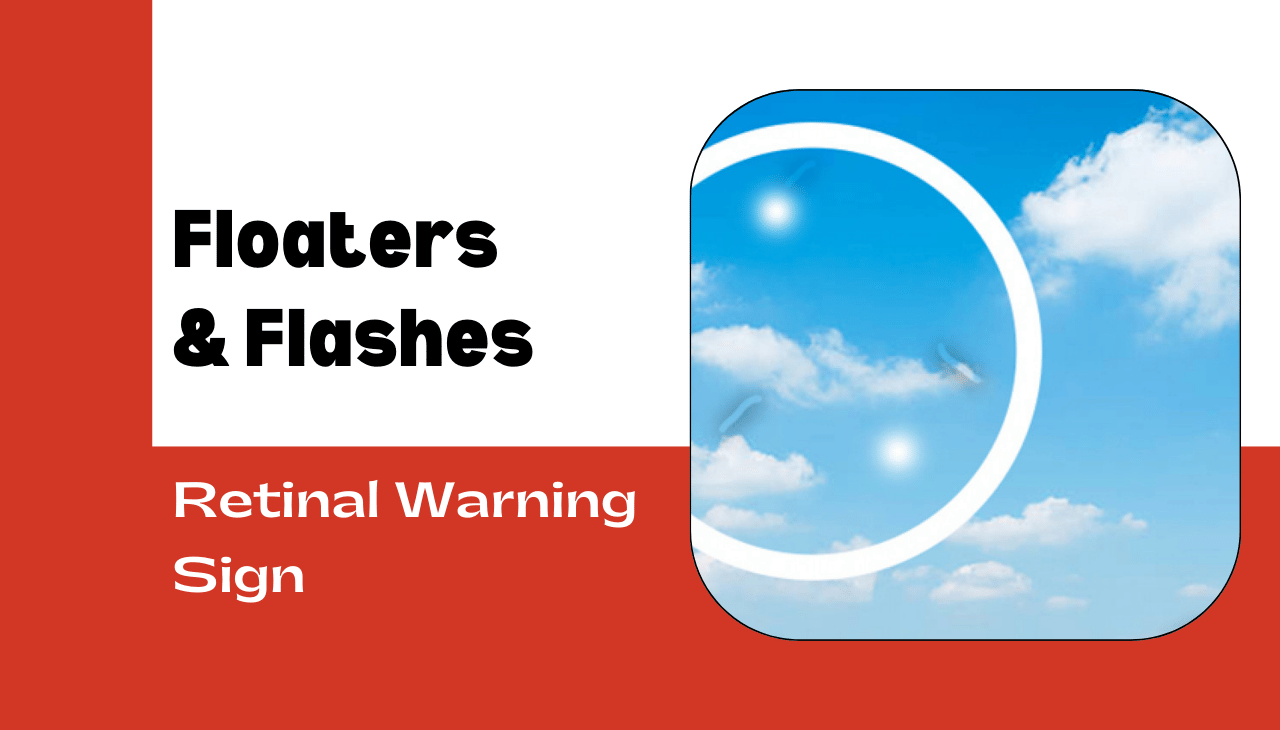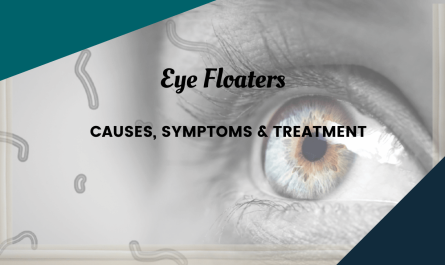Have you ever noticed tiny specks or flashes of light in your vision that seem to appear out of nowhere? While these occurrences might seem harmless or temporary, they could be your eye’s way of signaling a deeper issue. Floaters and flashes are common visual phenomena that most people experience at some point in their lives, but when should you worry?
In this blog, we’ll explain what floaters and flashes really are, why they happen, and whether they indicate a serious retinal problem. We’ll also cover treatment options, tips on what to do if you experience them, and when to seek help from a specialist.
Understanding Floaters & Flashes

What Are Floaters?

Floaters appear as tiny dots, strings, cobwebs, or specks that drift across your field of vision. They are especially noticeable when looking at a plain background, like a white wall or a clear sky. Floaters are actually small clumps of collagen or cells inside the vitreous—the gel-like substance that fills the inside of your eye.
As you age, the vitreous begins to shrink and pull away from the retina, leading to the development of floaters. Most of the time, they are harmless and simply a part of the natural aging process.
What Are Flashes?

Flashes are sudden bursts or streaks of light that you may see, especially in dim lighting or with your eyes closed. They occur when the vitreous tugs or rubs against the retina. These flashes can be short-lived or continue over days or weeks.
While occasional flashes can be benign, frequent or new flashes may suggest a more serious issue, such as a retinal tear or detachment.
Impact on Daily Life
Even when not linked to a serious condition, floaters and flashes can impact your quality of life. People often report difficulty focusing, reading, or working on digital screens. For those in professions requiring high visual accuracy—like graphic designers, surgeons, or drivers—this can be frustrating.
While most adapt to minor floaters, persistent symptoms can cause anxiety or distractions. Understanding that many floaters are benign helps reduce stress, but regular eye checkups ensure peace of mind.
How to Monitor Your Symptoms
Monitoring changes in your vision can help catch retinal issues early. Here’s what you can do:
- Maintain a visual journal: Note any new floaters, flashes, or changes in vision.
- Cover one eye at a time: This can help detect if the issue is isolated to one eye.
- Check for shadows or blind spots: Use a blank wall to test your visual field.
- Notice patterns: If floaters are suddenly accompanied by flashes or darkness, consult a doctor.
Early detection of retinal tears or detachments can be vision-saving, making self-monitoring an important habit.
Eye Health Myths vs. Facts
There are several misconceptions about floaters and flashes. Let’s bust a few:
- Myth: “Floaters mean I’m going blind.”
Fact: Most floaters are harmless and age-related. - Myth: “Flashes are caused by stress or lack of sleep.”
Fact: While stress may increase awareness, flashes usually indicate vitreous traction or retinal issues. - Myth: “There’s nothing I can do about floaters.”
Fact: Persistent floaters affecting vision can be treated surgically if necessary.
Educating yourself helps you make better decisions regarding your eye health.
When to See a Retina Specialist
While optometrists and general ophthalmologists can assess your vision, certain symptoms may require a retina specialist:
- Sudden onset of multiple floaters and flashes
- Dark curtain-like shadow in your vision
- Loss of side vision or blurred central vision
- History of retinal detachment in the family
- Recent eye trauma or surgery
Retina specialists have advanced tools and training to detect and treat retinal conditions early, preventing permanent vision damage.
Causes & Concerns
Common Causes of Floaters & Flashes
- Aging: The most common cause, especially in people over 50.
- Posterior Vitreous Detachment (PVD): When the vitreous separates from the retina.
- Eye Injuries: Trauma can disrupt the vitreous structure.
- Diabetic Retinopathy: Can cause bleeding into the vitreous, resulting in floaters.
- Inflammation: Uveitis or other infections can trigger floaters.
When Is It a Retinal Warning Sign?
While floaters and flashes are often harmless, certain symptoms could indicate a retinal tear or detachment, which is a medical emergency:
- A sudden increase in the number or size of floaters
- Persistent flashes of light
- A curtain-like shadow or loss of vision in any part of your visual field
- Blurred or distorted vision
If you experience any of these, consult an eye specialist immediately.
Treatment & Management
Observation
In most cases, floaters and occasional flashes don’t require treatment. Your brain usually adapts to ignore floaters over time.
Medical Treatments
If floaters or flashes are due to a retinal tear or detachment, urgent treatment is required:
- Laser Therapy or Cryopexy: Used to seal small retinal tears.
- Vitrectomy: A surgical procedure to remove the vitreous gel if floaters severely affect vision or if there’s a retinal detachment.
- Anti-inflammatory Drops: Used in cases caused by inflammation or infection.
Preventive Tips
- Avoid rubbing your eyes or engaging in high-impact activities without protection.
- Get regular eye exams, especially after the age of 40.
- Manage health conditions like diabetes and hypertension to prevent retinal issues.
Expert Eye Care at Laxmi Eye Institute
Laxmi Eye Institute is one of Mumbai’s most trusted names in advanced eye care for over 30 years. With a reputation built on excellence, transparency, and compassionate service, Laxmi Eye Institute is home to some of the most experienced ophthalmologists in India.
From routine eye checkups to complex retinal surgeries, the hospital provides state-of-the-art care in Panvel, Kharghar, Kamothe, and Dombivli. Specialties include Specs Removal / LASIK (Bladeless, Contoura, ICL/IPCL), Cataract, Glaucoma, Diabetic Eye Management, Retina Treatment, Pediatric Ophthalmology, and Corneal Diseases.
📍Clinic Locations:
- Dombivli: 1st Floor, SS Business Park, Gharda Circle, Dombivli East
- Kharghar: Office 108-110, 1st Floor, Anant CHS, Sector 4
- Panvel: Mulla Hamid Road, Old Panvel
- Kamothe: Near ICICI Bank, Pratik Gardens, Sector 34
📞 To book your consultation, visit https://laxmieye.org/ or call your nearest branch today.
Frequently Asked Questions (FAQs)
1. Are floaters and flashes permanent?
Floaters often become less noticeable with time, and occasional flashes may stop. However, persistent or increasing symptoms should be evaluated by a doctor.
2. Can floaters be removed permanently?
In severe cases, a vitrectomy may be performed to remove them, but it’s rarely needed unless vision is significantly affected.
3. Are floaters a sign of eye disease?
Not always. They are common with aging but can also signal retinal issues or inflammation.
4. Do flashes mean I will go blind?
Not necessarily. However, repeated or intense flashes can indicate a retinal tear or detachment, which requires immediate treatment to prevent vision loss.
5. Is it normal to see floaters after cataract surgery?
Yes, some people notice floaters more after cataract surgery, as the clearer lens makes them more visible. Consult your doctor if they worsen.
6. Can stress or fatigue cause floaters and flashes?
They’re not direct causes, but stress and fatigue may make you more aware of them.
7. How often should I get my eyes checked?
Adults over 40 should have an eye exam at least once every 1–2 years, or as recommended.
8. What’s the difference between retinal tear and detachment?
A tear is a small hole in the retina, while detachment is when the retina pulls away completely. Both need immediate medical attention.
Conclusion
Floaters and flashes are more than just visual nuisances—they could be early signs of serious retinal problems. While many cases are harmless, it’s essential to stay vigilant and seek expert care if symptoms change or worsen.
Your vision is priceless. If you or someone you know is experiencing floaters or flashes, don’t ignore the signs. Reach out to a trusted eye care provider like Laxmi Eye Institute and ensure your eyes get the care they deserve.




